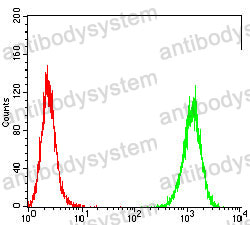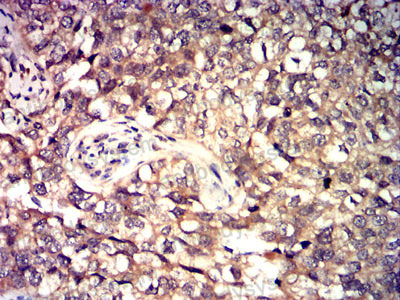Catalog No.
RHJ56402
Species reactivity
Human
Host species
Mouse
Isotype
IgG1
Clonality
Monoclonal
Tested applications
ELISA: 1:10000, FCM: 1:200-1:400, IHC: 1:200-1:1000
Target
Keratinocyte transcription factor KET, P63, KET, Tumor protein p73-like, p63, P73L, CUSP, P73H, p40, Tumor protein 63, TP73L, Transformation-related protein 63, TP63, Chronic ulcerative stomatitis protein, p73L, p51
Concentration
1 mg/ml
Endotoxin level
Please contact with the lab for this information.
Purity
>95% as determined by SDS-PAGE.
Purification
Protein A/G purified from cell culture supernatant.
Accession
Q9H3D4
Applications
ELISA, FCM, IHC
Form
Liquid
Storage buffer
0.01M PBS, pH 7.4, 0.05% Sodium Azide.
Stability and Storage
Use a manual defrost freezer and avoid repeated freeze-thaw cycles. Store at 4°C short term (1-2 weeks). Store at -20°C 12 months. Store at -80°C long term.
Clone ID
R3W47
Two distinct durable human class-switched memory B cell populations are induced by vaccination and infection., PMID:40173042
Sulforaphane impaired immune checkpoint blockade therapy through activating ΔNP63α/PD-L1 axis in gastric cancer., PMID:38780147
Complex and variable regulation of ΔNp63 and TAp63 by TGFβ has implications for the dynamics of squamous cell epithelial to mesenchymal transition., PMID:38538801
Reciprocal inhibition between TP63 and STAT1 regulates anti-tumor immune response through interferon-γ signaling in squamous cancer., PMID:38509096
Non-small cell lung carcinoma with focal coexpression of thyroid transcription factor-1 and Δ Np63/p40: A case report., PMID:38478955
Genetic Characterization of Primary Mediastinal B-Cell Lymphoma: Pathogenesis and Patient Outcomes., PMID:38055913
Tumour 63 protein (p63) in breast pathology: biology, immunohistochemistry, diagnostic applications, and pitfalls., PMID:38012539
Investigating the cell membrane localization of PADI4 in breast cancer cells and inhibition of anti-PADI4 monoclonal antibody., PMID:37804426
Analysis of a new therapeutic target and construction of a prognostic model for breast cancer based on ferroptosis genes., PMID:37643511
Regulation of XPC Binding Dynamics and Global Nucleotide Excision Repair by p63 and Vitamin D Receptor., PMID:36877866
ALK-negative anaplastic large cell lymphoma with DUSP22 rearrangement has distinctive disease characteristics with better progression-free survival: a LYSA study., PMID:36453105
Identifying pathways regulating the oncogenic p53 family member ΔNp63 provides therapeutic avenues for squamous cell carcinoma., PMID:35196980
Characterization of Tumor-Associated Macrophages and the Immune Microenvironment in Limited-Stage Neuroendocrine-High and -Low Small Cell Lung Cancer., PMID:34200100
Immunohistochemical Detection of p40 Expression in Lung Cancer Clinical Samples., PMID:33683682
The HPV and p63 Status in Penile Cancer Are Linked with the Infiltration and Therapeutic Availability of Neutrophils., PMID:33273057
CD44v3-Positive Intermediate Progenitor Cells Contribute to Airway Goblet Cell Hyperplasia., PMID:33264080
TAp63 and ΔNp63 (p40) in prostate adenocarcinomas: ΔNp63 associates with a basal-like cancer stem cell population but not with metastasis., PMID:33037932
Pan-p63 but not ΔNp63 (p40) expression in undifferentiated carcinoma of the pancreas., PMID:32729306
TP63, SOX2, and KLF5 Establish a Core Regulatory Circuitry That Controls Epigenetic and Transcription Patterns in Esophageal Squamous Cell Carcinoma Cell Lines., PMID:32619460
Impact of Bevacizumab on Experimentally Induced Endometriotic Lesions: Angiogenesis, Invasion, Apoptosis, and Cell Proliferation., PMID:32542537
Role of the TAp63 Isoform in Recurrent Nasal Polyps., PMID:31903890
[Current standard in diagnostic and therapy of peripheral T-cell lymphoma]., PMID:31594013
∆Np63/p40 correlates with the location and phenotype of basal/mesenchymal cancer stem-like cells in human ER+ and HER2+ breast cancers., PMID:31591823
Perturbed myoepithelial cell differentiation in BRCA mutation carriers and in ductal carcinoma in situ., PMID:31519911
Molecular pathology of the luminal class of urothelial tumors., PMID:31232464
Signature maps for automatic identification of prostate cancer from colorimetric analysis of H&E- and IHC-stained histopathological specimens., PMID:31061447
Anaplastic Large Cell Lymphoma: Contemporary Concepts and Optimal Management., PMID:30596216
Integrated epigenomic and transcriptomic analysis reveals TP63 as a novel player in clinically aggressive chronic lymphocytic leukemia., PMID:30447004
TP63-Mediated Enhancer Reprogramming Drives the Squamous Subtype of Pancreatic Ductal Adenocarcinoma., PMID:30428345
Benign and malignant odontogenic neoplasms of the jaws show a concordant nondiscriminatory p63/p40 positive immunophenotype., PMID:30309829
p63-Dependent Dickkopf3 Expression Promotes Esophageal Cancer Cell Proliferation via CKAP4., PMID:30181180
BET bromodomain inhibitor JQ1 preferentially suppresses EBV-positive nasopharyngeal carcinoma cells partially through repressing c-Myc., PMID:29988031
Co-localisation of Glandular and Squamous Cell Markers in Non-small Cell Lung Cancer., PMID:29848682
Spatially correlated phenotyping reveals K5-positive luminal progenitor cells and p63-K5/14-positive stem cell-like cells in human breast epithelium., PMID:29743728
Novel heterozygous pathogenic variants in CHUK in a patient with AEC-like phenotype, immune deficiencies and 1q21.1 microdeletion syndrome: a case report., PMID:29523099
p63 isoforms in triple-negative breast cancer: ΔNp63 associates with the basal phenotype whereas TAp63 associates with androgen receptor, lack of BRCA mutation, PTEN and improved survival., PMID:29484502
34BetaE12 and Alfa-Methylacyl Coenzyme A Racemase (AMACR) Antibodies Better Than p63 Antibody Distinguish Normal and Neoplastic Glands in Prostatic Tissue With Thermal Artifacts., PMID:29346181
Possible Usage of p63 in Bioptic Diagnostics., PMID:31023021
Human aniridia limbal epithelial cells lack expression of keratins K3 and K12., PMID:29162348
Effectiveness of computer-aided diagnosis (CADx) of breast pathology using immunohistochemistry results of core needle biopsy samples for synaptophysin, oestrogen receptor and CK14/p63 for classification of epithelial proliferative lesions of the breast., PMID:28630050
P40 Immunostain Does Not Outperform p63 as a Myoepithelial Cell Marker in the Daily Practice of Breast Pathology., PMID:28549030
[Application of PLA Method for Detection of p53/p63/p73 Complexes in Situ in Tumour Cells and Tumour Tissue]., PMID:28471195
Decreased TAp63 and ΔNp63 mRNA Levels in Most Human Pituitary Adenomas Are Correlated with Notch3/Jagged1 Relative Expression., PMID:28078618
A combination of p40, GATA-3 and uroplakin II shows utility in the diagnosis and prognosis of muscle-invasive urothelial carcinoma., PMID:27594510
Expression studies of nectin-1 in human hair follicles and identification of a p63-responsive element in the NECTIN1 promoter., PMID:27516130
Association of variations in HLA class II and other loci with susceptibility to EGFR-mutated lung adenocarcinoma., PMID:27501781
Napsin A/p40 antibody cocktail for subtyping non-small cell lung carcinoma on cytology and small biopsy specimens., PMID:27412420
Expression of p40 (∆Np63) protein in meningiomas, an unexpected finding: immunohistochemical study and evaluation of its possible prognostic role., PMID:27394131
Myoepithelial cells in lobular carcinoma in situ: distribution and immunophenotype., PMID:27195907
p63 expression confers significantly better survival outcomes in high-risk diffuse large B-cell lymphoma and demonstrates p53-like and p53-independent tumor suppressor function., PMID:26878872


